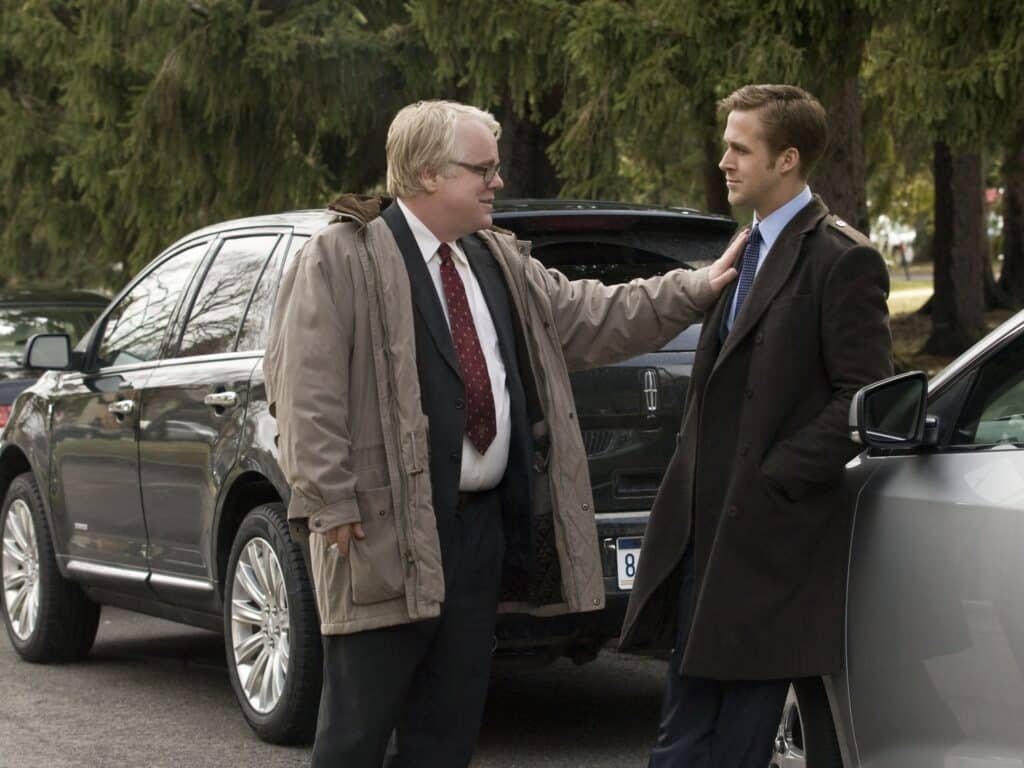Read also:
How to Watch FX Live Without CableHow To Watch AMC Without CableHow to Watch ABC Without CableHow to Watch Paramount Network Without CableBefore he passed away at the age of 46, Philip Seymour Hoffman starred in 52 feature films. Starring roles, character pieces, chameleon work—he left a legacy nearly unmatched in both quality and quantity. Now, with P.S.H. I Love You, Jonah Koslofsky wafts through the cornucopia of the man’s offerings.
Does anyone remember The Ides of March? I ask in good faith – classy, Oscar-nominated dramas featuring multiple movie stars rarely go so forgotten. Co-written, directed and co-starring George Clooney, this obviously outdated look at American politics finds its groove as middling entertainment. It’s fine!
Does The Ides of March take place in 2008 or 2012? Who knows! Whenever it’s set, Governor Mike Morris (Clooney) is running for President – but he’s got to secure the democratic nomination first. He’s got a crack team behind him, led by campaign manager Paul Zara (Philip Seymour Hoffman), and top hot-shot consultant Stephen Meyers (Ryan Gosling). A dozen hundred delegates deep, Morris – an idealistic progressive as handsome as Clooney – finds himself locked in a tight race against a senator who might be even more to the left.
Or maybe his opponent is a moderate? Who knows! None of the actual politics make much sense, nor do they matter. Based on the play Farragut North, it turns out this 2011 drama was just a practice run for writer Beau Willimon’s real outing, House of Cards. As in his (now infamous) Netflix show, Willimon’s interested in the people behind the power, the staffers pulling the strings, the con games of American politics.

And so protagonist Stephen takes a meeting with rival campaign manager Tom Duffy (Paul Giamatti) – as inciting incidents go, they don’t get much duller. He flirts with Evan Rachel Wood’s Molly Stearns, who’s here in what passed for a three-dimensional role for a woman nine years ago. Then there’s plenty of scheming and backroom dealing.
As director, Clooney fails to elevate this material into a memorable story. At least it’s competently shot: unlike House of Cards’ slick, clean, digital look, Clooney and cinematographer Phedon Papamichael (Nebraska, Ford V. Ferrari) pick an old-fashioned, at times over-exposed style that almost reminded me of Before the Devil Knows You’re Dead (though that could’ve been because Hoffman again shares the screen with Marisa Tomei).
Then again, Clooney never conjures any distinct frames – the closest he comes is a shouting match between Zara and Meyers behind an enormous American flag. Surely a subtle composition. There are a lot of conventionally-shot people talking in rooms – the most ambitious image lies on the poster.
Alas, no one – not even Philip Seymour Hoffman – turns in a remarkable or standout performance.
But what a cast! The sheer quantity of talented people turning in middle-of-the-road work is a sight to behold. Even the ever-underrated Jeffrey Wright shows up doing a Jesse Jackson impression. Alas, no one – not even Philip Seymour Hoffman – turns in a remarkable or standout performance.
As the principled Paul, his character wants to win and values loyalty. When Stephen appears disloyal, he gets really mad and delivers a big speech or two. That’s pretty much his entire role. This isn’t The Talented Mr. Ripley: Hoffman doesn’t push his supporting part to new heights or reveal what wasn’t on the page. Like the other performers, Hoffman’s just sort of there, saying his lines with varying degrees of intensity. I wouldn’t say he’s phoning it in. He’s fine.
Honestly, that’s fine too! It would be unreasonable to expect any actor to turn in groundbreaking work every time they take a part. In a way, watching the The Ides of March gave me a greater appreciation for Hoffman’s oeuvre: it’s almost refreshing to see him turn in something average when he usually contributes so much more. Maybe he liked the script, or needed a paycheck.
The film as a whole fits into the same framework – The Ides of March may not be anything special, but it’s entirely inoffensive. To actually be realistic and relevant to modern politics (even on release), the whole project would’ve needed such drastic rewrites that one would be left with an entirely different movie. How much can you really fault a film that aims low, but hits its mark? We don’t need to beware The Ides of March – remembering its mediocrity will do just fine.